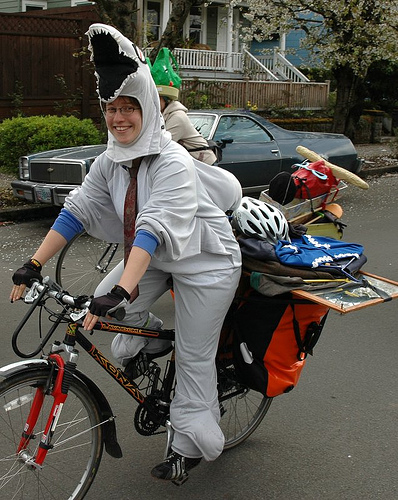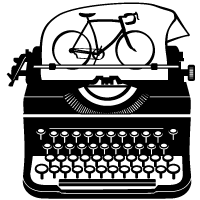
Photo by Jim Parsons from cycleandstyle.com
Elly Blue is a bike activist. She also writes a column for Grist, contributes to BikePortland, writes and edits a zine she started called Taking the Lane (the first issue of which I reviewed for PubliCola this summer), went on a nationwide speaking tour, and organizes bike events, meetings, and conferences. She paused for a moment to tell me about her foray into bike activism, some of the barriers women face in cycling (and in life), and why Portland isn’t always the biketopia it’s cracked up to be.
How did you become such a fervent bike activist/advocate writing, speaking, organizing events, etc?
The “etc” in that question really sums it up. I haven’t been very focused in my career–until last year it wasn’t even my day job. I can do better talking about the “why bikes” part:
Cars never made a lot of sense to me, but I’ve always needed to move around a lot, explore different places, go somewhere. When I was younger I walked everywhere or took transit. I did parts of the Appalachian Trail and hitchhiked long distances. I rode beater bikes around town for years as an adult, but didn’t think about it much politically until I fell in with Portland’s bike fun and activist group Shift in 2005. My plan at that time was to go to grad school and be immersed in anthropological theory all day every day for the rest of my life.
Instead I got obsessed with bicycling.
Shift is like Critical Mass, leaderless and run on a fairly ad hoc basis. Both are conducive to some random person showing up and having a madcap scheme and running with it. If it’s a good idea and you’re willing to put the work in you can find all the genius collaboration, hardworking experts, raging after parties, and even funding that a young, would-be activist could hope for. I showed up for a meeting and got put to work helping someone compile an events calendar, which led to leading rides myself, which led to bigger events, culminating in the Towards Carfree Cities conference in 2008 which burnt me out pretty good.
I forget exactly how I ended up working full time at BikePortland, but there was beer involved and I really needed a job at the time. For the past year I’ve been trying to make a living doing all the things you listed. My zine is a lot of fun. And my column at Grist has been a good chance to talk about bikes for a wider audience.
The first issue of your zine Taking the Lane is about the disparities women cyclists face, some of which are barriers that can prevent women from riding at all. Obviously this is too large an issue to tackle in-full in an interview, but what sorts of inequities do you and other women cyclists face? What needs to happen for that to change?
I don’t want to overstate the gender barrier when it comes to bicycling. It’s more that there’s a gender barrier in life and that affects everything, including transportation choices. Women make 70% of the income men do in similar jobs, but do far more of the unpaid labor and are the primary caregivers, even in relationships where both partners work full time.
If you look at most of the cycling commute guides out there they are full of masculine imagery and details about gear ratios and assume that you just need to go to work and then home again and are excited to get a sweaty workout. There isn’t a guide for using a bike to get three kids to two different schools on opposite sides of town and pick up groceries for the week and still get to work on time. Our cities aren’t built for that any more.
For the second issue of my zine, I interviewed a wheel builder about her
experience in the bike industry, which is also very male and also fascinating. Her take on sexism was complex but her most practical point was not to dwell on it. “Giving any part of that my energy or my thoughts only draws attention to it.”

Activism is serious business. Photo by Jonathan Maus.
Americans tend to look at Portland as the ultimate biketopia, but one of the central aims of your recent “Off The Chainring” speaking tour was to dispel that idea. Why?
Compared to many other cities, Portland is a great place to ride a bike. But we aren’t where we need to be and on the advocacy front we’ve spent a bit too much time celebrating our victories. Meanwhile our famously bike-friendly mayor has been steadily installing or supporting new road infrastructure that’s hazardous to bicycling–ill placed streetcar tracks, a couplet with a disastrously placed bike lane, a wall to prevent people from crossing the street at a major transit center so that cars can move through faster. And the advocacy community has just taken it. I’d like to see other cities do it better, if only to light a fire under us again. New York City has far more momentum right now than we do.
Advocates have a lot of different ideas about what it’ll take to increase bicycling-as-transportation in America including better education, better infrastructure, less focus on cycling for sport. What do you think it’ll take to grow bicycling in America beyond its current .5 percent national average?
I think that we get on bikes in the first place for social reasons. Because it’s normal and mainstream like in Copenhagen, or because we are entranced by the freaky bike subcultures here, or for economic or environmental concerns, or to keep up with our spouse. It’s all about belonging in some sense. But then we’ll only keep riding if the experience isn’t terrifying and violent every day. Which is an infrastructure issue. And in order to get the infrastructure done right, you need a movement.
You’re an active Portland bike advocate. Your writing is getting published all over the place and you’re building a following. What’s next for Elly Blue?
The project I’m most excited about right now is helping start a business alliance for women. It’s called the Portland Society and the energy in the room at our monthly meetings is intense and amazing. The focus is on improving Portland’s business and bicycling climate. We don’t talk about gender, but you can tell that for many members it’s rare to be in a place where they don’t have to work extra hard to be heard and taken seriously.
I’m always happiest when I’m immersed in producing things collaboratively. An event, a ride, a zine, an organization, dinner. The next step on that tip is to write a book, which is daunting. And we’re going on tour again in April, this time with a vegan chef and a punk rock star. Maybe we’ll see you in Seattle on April 3rd.

Pingback: A call for tougher hit-and-run laws; cycling legend Gino Bartali hid family from Nazis during WWII « BikingInLA
Pingback: Anna Brones: Food, Bikes, and Life Well Lived | The Bicycle Story